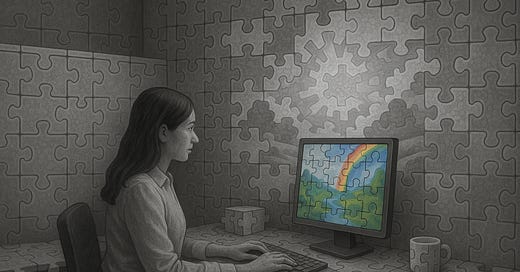In The Role of Suffering we talked about how suffering is one of the tools to create space for presence. Maybe not just a tool, but an invitation and that we don’t need to seek suffering, merely draw from prior experience to find the emotion. But what is the point?
If you have been watching ‘The White Lotus’ there’s a scene where a buddhist monk leads a quick mindfulness practice and talks about observing thoughts, letting them enter the mind, and shuffling them away. In this way, mindfulness is presented as presence.
It took me a long time to understand the purpose of letting the thoughts be and just re-centering the mind, not judging the thoughts or the mind for having them. What are these thoughts? Where do they come from and why? And why would I let them be instead of forcing them away and trying to keep them from coming back? What’s the point?!? I wanted to get better at the mindfulness, wouldn’t everyone?
Mindfulness is a path to presence but presence isn’t just mindfulness and I think ‘practicing mindfulness’ is missing something. Presence isn’t about escaping thoughts and focusing on the stillness. Reducing resistance is a great practice, but nobody told me the next step - participation in the moment. To me presence is engagement of all of my senses. Seeking nothing, just fully here with every cell in my body. Not zoning out, but zoning IN.
Presence is not something we achieve like a goal. It’s not better. It’s something we remember. It’s already there, waiting for you.
But….whyyyyyyssssss?
Ok, well, it’s a long story, but I can tease it. Presence gives our actions weight. It’s taking control of our puzzle and building the puzzle rather than walking through it. With presence a conversation becomes connection, a chore becomes honoring our world, and every moment we hold it becomes the most important moment we have - the now.
It’s so easy for my mind to disengage and for me to skim through a day. If I’m waiting on a bigger day or not wanting to do the things I have to do in that day. I don’t have to pay attention every day. Many of us have setup lives where we don’t really have to pay attention at all. My first job out of college was as an engineer but really I was an errand boy for the experienced engineers. I was to learn process, but there were no dedicated teachers so I had to wait for learning moments and then be engaged.
Most days I turned my brain off. It was like I could feel my brain atrophying. I was miserable. And soon they let me go, at least in part cause I had started my first company while there, but primarily because I was not engaged - I was not present. I think had I managed presence on a regular basis I likely would have been kept on, but I think I also would have noticed that the tasks were not ones my brain really wanted to do.
Presence would have changed my days and my path. But I don’t think it changes who we are, it helps reveal to us who we really are.
So, how do we incorporate the daily practice of presence? I’m getting a tattoo that says simply - ‘chop wood. carry water.’ Up next.




